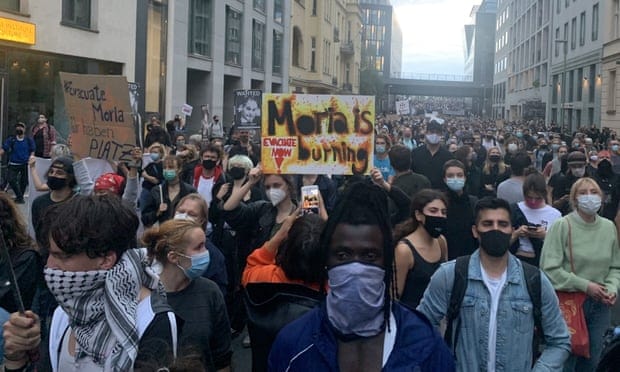Angela Merkel says countries will help minors from Moria camp destroyed by fire
Germany and France want to take in children who were left without shelter after fires gutted an overcrowded refugee camp on the Greek island of Lesbos this week, Angela Merkel has said.
“I asked the Greek prime minister how we could help. And his wish was that we take in minors who have been brought to the mainland,” the German chancellor said. “We have established contact with France. Germany and France will take part [in this effort].”
Thousands of protesters in cities across Germany had appealed to the government to accept refugees from Moria, despite government resistance.
In Berlin, around 3,000 people demonstrated under the motto “We have room” on Wednesday evening, condemning Moria as a “camp of shame” and calling for the resignation of the interior minister, Horst Seehofer, who had blocked the arrival of refugees. Similar protests took place in other cities, including Leipzig, Hamburg and Frankfurt.
Seehofer has been under growing pressure for months to accept refugees from Greece, but issued a nationwide veto on such a move.
German law requires that states and districts only accept refugees if they have the agreement of the federal government. At least six states have joined an initiative to change the regulations.
Seehofer and other leading conservatives, such as Armin Laschet, the leader of North Rhine-Westphalia, have insisted Germany should wait to receive agreement from other EU countries first that they will also take in a share of the Moria inhabitants. Otherwise the government fears it risks sending a message that Germany has an open door, and this will trigger a repeat of 2015 when almost a million refugees arrived, the political fallout from which is still being felt.
Merkel’s intervention on Thursday suggests a U-turn at federal level, though she stressed the need for a European solution. “Migration is not the problem of the countries where people are arriving,” Merkel said. “Neither is it a German problem. And it must become more of a European responsibility.”
The fires this week, which have wiped out the camp and left its almost 13,000 inhabitants without shelter, have intensified the debate.
Some demonstrators on Wednesday gathered in front of the interior minister, chanting: “Evacuate immediately.”
Amid signs of rifts within Merkel’s coalition government, on Thursday 16 MPs from her conservative alliance wrote to Seehofer calling for him to allow in 5,000 refugees, if necessary without agreement from other EU countries.
“The terrible fire has further worsened the already catastrophic situation in Moria,” the signatories wrote. “The main priority should now not be to formulate a common European refugee policy, but to alleviate the obvious human need. We urge you to enable Germany to take – if possible together with other EU states, but if necessary also alone – 5,000 refugees from Greece.”
The development minister, Gerd Müller, said Germany should take in 2,000 refugees, as a “sign of humanity”.
In total, 170 German towns and cities have signalled their willingness to welcome refugees from Moria.
Events on Lesbos increased pressure on Merkel to change her government’s course. Having recently taken over the presidency of the council of the EU, Germany has stubbornly adhered to a long-term goal to secure a European solution, although the refusal by countries such as the Netherlands and Austria to take in Moria inhabitants has made it increasingly remote.
On Monday, before the fires began, the pro-refugee initiative Seebrücke (Sea Bridge) assembled 13,000 empty chairs in front of the Bundestag in Berlin under the slogan “we have space”, one for each of the Moria inhabitants, who it said had been “left to vegetate” with inadequate medical provision and no ability to physically distance to avoid coronavirus.

